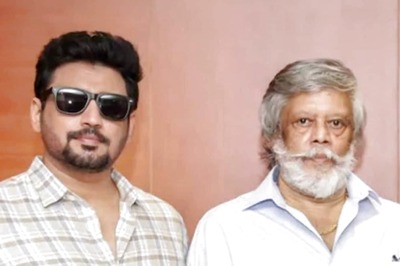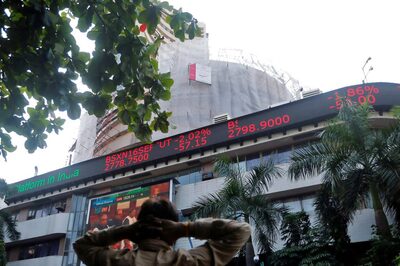Chargeup is Offering a 2-Minute EV Battery Swap Within a Radius of 2 Km for Increased ROI: Interview

views
The main obstacle for vehicle buyers looking for electric vehicles is the initial cost of ownership and the ‘Rage Anxiety’. While a recent report by Bloomberg New Energy Finance (BNEF) stated that within 5 to 7 years the EV charges would be lower than the conventional powered vehicles, the range anxiety still remains a concern. To address this, a lot of private players and government backed charging stations are being installed across the country. This, besides the slew of at-home charging options being offered along with electric vehicles.
According to a June 2020 report by the Central Electricity Authority, there were 933 electric vehicle (EV) charging stations—for both two-wheelers and four-wheelers—across the country. For a country this big 933 EV chargers are like a drop in the ocean. To support the EV penetration further, India needs more than fixed spot chargers and one such technology is called ‘Battery Swapping’. We got in touch with Varun Goenka, Co-Founder and CEO, Charge-up, a company offering India-made Swapping Network. Here’s our conversation-
Q.Tell us about Charge-up and its operations
Charge-up is building Bharat’s largest battery swapping network for e-rickshaws. We have adopted an advanced technology driven approach through which we offer Battery as a Service (BaaS) solutions to e-rickshaw drivers. The company is distinct in its endeavours due to its standardised battery technology and execution capabilities committed to deliver its brand promise of a 2-minute battery swap within a radius of 2 km to ensure twice the revenue of our drivers and dealer partners.
To achieve this, we are building an ecosystem wherein each dealer partner caters to a minimum of 25-30 drivers per station, enjoying greater ROI. With 40% month on month growth, Chargeup is adding a station every week to its current pool of 12 active stations spread across Delhi. Currently 400+ are drivers on Chargeup platform covering more than 4 lac kms per month. We are on the path to achieve 200 stations with Rs 3 crore MRR, in this FY.
Q.What exactly is battery swapping and why is it necessary?
Battery swapping is a simple and efficient technology driven solution to the biggest challenges that EV drivers face. By subscribing to battery swapping service, the EV owners are freed from the need of purchasing expensive batteries which make up as much as 40% of a vehicle’s cost. Typically, an EV can only cover a certain number of kilometres before returning to base for charging which takes several hours.
Thus, the operational range is quite limited. However, with battery swapping, one can easily drive into a swapping station, swap the discharged battery with a charged one and get back on the road in a matter of minutes. It is necessary to eliminate the range anxiety and high capital cost of buying an EV. Fast charging can create the issue of grid destabilise and requires huge infra to support the waiting hours.
Q.What all electric vehicles do you cater to and where?
We have stared our operations primarily with e-rickshaws and e-loaders in Delhi and our plan is to expand the coverage to all categories of electric 2 & 3 wheelers for last mile mobility across India in the years to come.
Q.Is Charge-up grid a standardized grid for all battery types?
We have focused on creating a dependable and standardized battery technology and financial structuring. As batteries are the most expensive as well as crucial component of any EV and its performance determines the unit economics, we have undertaken a stringent process of validation, testing and robustness of the batteries offered by us. We have put them under a rigorous testing process across different climatic and operational conditions for about 1.5 years.
This sets us apart from the other providers who rely on sourcing their batteries from multiple vendors and don’t have any such standardization process in place. We have already deployed over a thousand batteries under the leasing scheme and these batteries are agnostic to the make of vehicle.
Q.How do you see the current EV market of India?
Environmental sustainability and green tech adoption is high on the priority lists for everyone today. Since Indian cities are constantly combating severe vehicular pollution, a clean fuel alternative such as electric vehicles is ideal for the country. India has a massive scope for EV adoption. According to estimates by Mordor Intelligence, the Indian Electric Vehicle Market was valued at USD 5 billion in 2020 and is expected to reach USD 47 billion by 2026 registering a CAGR of above 44% during the forecast period (2021 – 2026).
Under the FAME-II (Faster Adoption and Manufacturing of Electric Vehicles-II) initiative, the Government of India plans to convert 30% of all passenger vehicles into EVs by 2030. Recently, Minister of Road Transport and Highways, Mr Nitin Gadkari launched the Go Electric campaign and he shared his vision of making electric vehicles as common in India as the petrol and diesel vehicles in the years to come. The Indian automobile makers have the capability to indigenously produce ample number of vehicles and make India a leader in EV adoption.
Mr Gadkari also announced that all vehicles used/owned by the Government of National Capital Territory of Delhi will be converted into electric vehicles by August 2021. All these developments and initiatives augur well for India’s future. However, alongside producing the EVs, the country will also require building of a massive battery charging and swapping infrastructure. The EVs are crucial to achieving he objective of sustainable transportation and through our services, we are set to play a role in empowering the change.
Q.What challenges are there in battery swapping tech?
Battery swapping technology faces two highly anticipated challenges:
• What if the batteries become cheaper?
• What if fast charging enables 15 minutes charge?
However, Charge-up believes that even if these situations do occur, battery swapping would still continue to make a great difference in terms of efficiency and economy. Developments like these would lead to snaking queues at charging stations, just like how we see at the CNG pumps.
Further, the charging of Li-ion batteries requires controlled environment and preventive maintenance for longer life. Therefore, fast charging will require integration with high cycle life of batteries otherwise there won’t be any benefits for the vehicle owners, and they will also have to bear the responsibility of battery maintenance. All these challenges are overcome by battery swapping services. Another major challenge is the lack of standardization of the batteries by unregulated service providers.
Such operators procure batteries from wherever they can and usually focus on buying cheaper batteries without any detailed analysis and evaluation of the batteries. This results in variable outcomes as far as the battery performance, life and safety is concerned. Charge-up has focused on standardization of the batteries and rigorous testing and evaluation throughout the lifecycle of the batteries. It is the proliferation of unregulated operators which can give a bad reputation to the whole ecosystem, negating the potential battery swapping can offer.
Read all the Latest News, Breaking News and Coronavirus News here. Follow us on Facebook, Twitter and Telegram.














Comments
0 comment